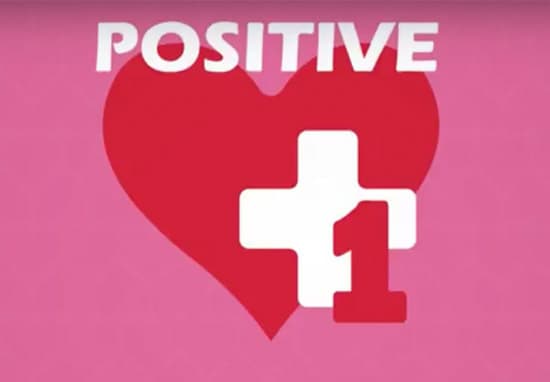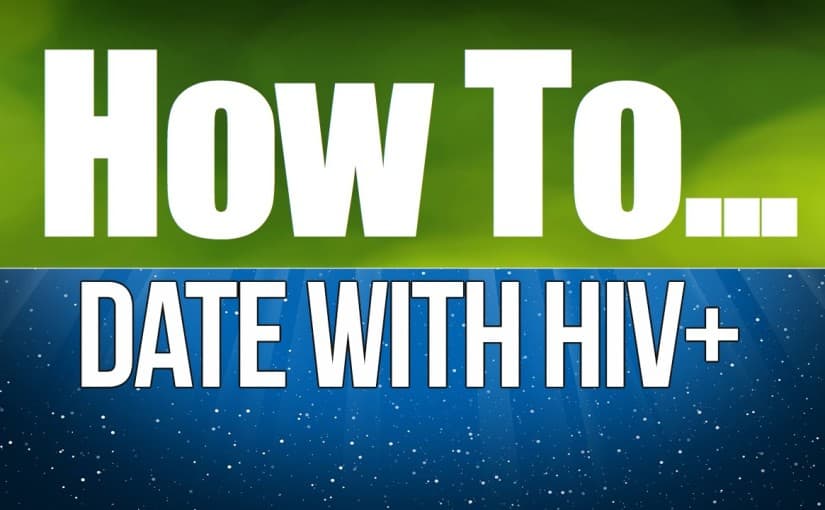
HIV treatment has come an incredibly long way, but unfortunately the same can't be said for HIV education. HIV is to many uneducated people, synonymous with AIDS. This is not only ignorant, but extremely harmful to people who live with HIV. Thanks to huge advances in treatment, people can live long and fulfilling lives with HIV, and provided they make sure to take their medication and their viral load remains undetectable, they cannot transmit the virus to their partners (even through unprotected sex), and they won't contract AIDS. Sexsearch is here with a handy guide full of important sex and testing information that everybody should know about dating an HIV-positive partner.
The current method used to identify whether or not someone who is HIV-positive can transmit the virus through their bodily fluids or not is to test their blood to see if their viral load is detectable or undetectable. If it's detectable, that means that they can transmit, and if it's undetectable, that means that they can't. It's unfortunate terminology because of the discrimination that was extremely prevalent towards HIV-positive men during the AIDS epidemic that took place in the 80s. There were many who believed that there were evil HIV-positive men who were intentionally infecting other men. So when you say undetectable, many uneducated assume that it means that they're hiding their diagnosis from potential partners. Of course that's not the case at all. These are just the terms that medical professionals have decided to use, so be sure to remember the difference.


HIV does not mix well with other STIs. If an HIV negative person has an STI, they can be up to five times more susceptible to contracting HIV through unprotected sexual activity with an HIV-positive partner with a detectable viral load. If an HIV-positive person has an STI, it makes their viral load more unstable and difficult to keep undetectable. Frequent testing for all types of STIs will allow you to continue to have unprotected sex if you and your HIV-positive partner choose to.
There's a good chance you've never heard of Serosorting before. It's thankfully not as prevalent as it once was, but in the gay community, there are pockets of men who believe that HIV-positive men should only have sex with other HIV-positive men, and that HIV negative men should only have sex with other HIV negative men. The thought being that since the HIV-positive men are already infected, they can have unprotected sex without consequence, and HIV negative men can have unprotected sex with each other without having to worry about getting HIV. Neither of those thoughts are based on medical knowledge or any sort of deep thought. Let us tell you why.
If you are also HIV-positive, you must still be diligent with your testing and meds. There are different kinds of HIV strains, and just because you and your partner are both HIV-positive doesn't mean that you have the same strain. If you are negligent in your treatment, you are putting your partner at risk, as they could be infected by you, and vice versa, which would leave you or your partner having to treat two strains of HIV instead of one. The virus strains will mutate, and when this happens, there is a higher risk of your system developing a resistance to your medication, rendering them ineffective.
Then there are the men who are only sleeping with men who they believe to be HIV negative, and think that they are reducing their chances of getting HIV by limiting their sexual partners to those who are not HIV-positive, and then partaking in unprotected sex. This method is very much unreliable though, because it is more often than not, relying on the honesty of your sexual partner (who you may not know very well), and also, there is a short period after the transmission of HIV where it isn't detectable by tests, so someone could be HIV-positive without knowing it.
Oddly enough, if you consider the fact that HIV-positive men get themselves tested far more frequently than HIV-negative men, you might consider them to be less of an HIV risk than HIV negative men who are frequently partaking in unprotected sex with men who they aren't completely certain aren't infected.
Serodiscrimination is an extremely disappointing form of discrimination within a community that has been, and continues to be the target of so many hateful and bigoted groups. HIV treatment has come so far, and there's absolutely no good reason for this to be happening. We understand wanting to reduce risk of HIV infection by the gay community, but serosorting has been scientifically proven to provide an extremely small decrease in people's chances to contract HIV. One that does not outweigh the harm it does to the HIV-positive community, and the general stigma of being HIV-positive.
Though it's true that when a person's viral load is undetectable, you aren't at risk of contracting HIV by having unprotected sex with them, or any bodily fluid exchange, if you and your partner are are not completely monogamous, we encourage you to use protection. For example, if your partner's last test was a month ago, there is a chance that within that time, their viral load could have become detectable. Your risk of infection is indeed very low, and we don't want to encourage any fear of your HIV-positive partner, because if managed properly, there's very little to worry about.
Another precaution that you might want to look into is the use of Pre-Exposure Prophylaxis. PrEP is a daily pill comprised of tenofovir and emtricitabine (two drugs which are used to treat HIV) can be taken by HIV negative partners to further reduce their chances of HIV infection by 90 to 99%. PrEP is often used by nurses in hospitals in case they accidentally jab themselves with needles used to treat HIV-positive patients. There are no major side-effects associated with PrEP, and those that do exist are minor. Some people may experience nausea as their system gets used to the medication.
As small as the risk of contracting HIV from your partner whose viral load is undetectable is, it goes without saying that it is even further reduced by being in a monogamous relationship. This will allow both of you to be sure that you aren't risking bringing any other STIs or viruses into your bedroom.
When dating a partner who's HIV-positive, it's very important to understand that they are frequently needing to educate others about HIV, current treatment, and the fact that they aren't contagious. This can be extremely stressful and exhausting, so we encourage everyone (not just those who are or are considering dating someone who's HIV-positive) to do their due diligence and educate themselves about HIV. There's a good chance that your HIV-positive partner went through an extremely dark time depending on when they were diagnosed. In the past, HIV was thought to be something that would ruin and/or end your life. Thankfully now, when properly treated, it's considered a chronic condition.
You might wonder why if HIV is so manageable now, why isn't it more common knowledge? Sexual education is so severely lacking because of uptight and conservative groups who believe that children should be shielded from sex until later in life. Because that education is being dictated by more conservative groups, it also ends up affecting the curriculum so that there is little to no sexual education taught for LGBTQ students and the issues they're more likely to encounter than their straight classmates. When they come out as queer, many of their classmates also then don't understand them as well as they should. So this feeling of being misunderstood is a very familiar to most people who are HIV-positive.
While the internet is a fantastic resource for information, you should always (ALWAYS) visit a doctor or testing clinic in order to get professional and up to date information on matters as serious as HIV. Medical professionals have all of the information while we only have some of it. Consistent treatment and frequent testing are incredibly important when it comes to living with or dating a partner who's HIV-positive. If you find yourself in a relationship with a partner who refuses to get tested as often as they should be, and/or are neglecting their medication, we must urge you to cease all unprotected sexual activity with them until they agree take better care of themselves, and acknowledge that their health plays a large role in your life. Remind them that if they aren't diligent in their treatment, it's not only themselves that they're hurting, but you.
Whether you finished that sentence with "Lovers" or "Communicators", both answers are typically true. The communication comes from the fact that since becoming HIV-positive, they have needed to have that difficult talk with every partner that they've been with. Some people of course are educated on the matter and aren't freaked out about it, but like we've said, many still are. Imagine having to have that difficult a conversation with every new partner. Their reaction is always a mystery, so HIV-positive people become very good at having serious conversations that a lot of people would usually shy away from if given the option. Communication is one of the most difficult parts of a healthy relationship, and dating a partner with HIV makes it surprisingly easy. The openness in their communication has a side benefit, which is that it improves their ability as a sexual partner. They aren't shy to ask you what you want, or tell you what they want.
There's a myth that is associated with HIV-positive people that they're reckless, and are willing to try anything sexual without giving it a second thought. This assumes that the reason that your partner contracted HIV through unsafe sexual practices, which is a dangerous and offensive assumption for a lot of people, since that's not the only way to contract HIV, and even if they did get it through intercourse, there's the chance that they misplaced their trust in a new partner, or a condom broke. So when you begin to date someone with HIV, it's much better to not jump to any conclusions about what they're into, or more importantly, how they became ill.
While there a lot of information to take in at the start of your relationship, you will soon enough go about your relationship like any other. Other than the odd test and perhaps some pills, unless you tell your friends and family that your partner is HIV-positive, there's almost no way for them to even know. Whether or not you share that information with them should be up to your partner, because their comfort level is paramount when it comes to this issue. We find that it's usually good to introduce your partner to some of your friends, and allow your partner to decide if they think they'll be receptive or perhaps frightened by the fact that they're HIV-positive.
If you tell your friends in advance of meeting them, and a couple drinks into the night, your BFF says something dumb about HIV to your partner, that's unfair to them. Meeting your partner's friends is a stressful situation enough without having to deal with your friends essentially defining them by their HIV.
We wish you and your new partner a incredibly fulfilling relationship, and hope that this article has been of some help to you in understanding what it's like to date when you or your partner is HIV-positive. This is just one article though, and we suggest you do further research. We're not experts, but doctors are. Consulting them will be a huge help to both you and your partner, to make sure that you're doing everything that you need to do to have a happy and healthy relationship.
Did we answer all your questions you needed on this subject? If so, then why not check out our other extensive dating advice guides by CLICKING HERE?
Want to find out if you really need to make V-Day plans with someone you just started dating? Find out now by reading our article HERE!